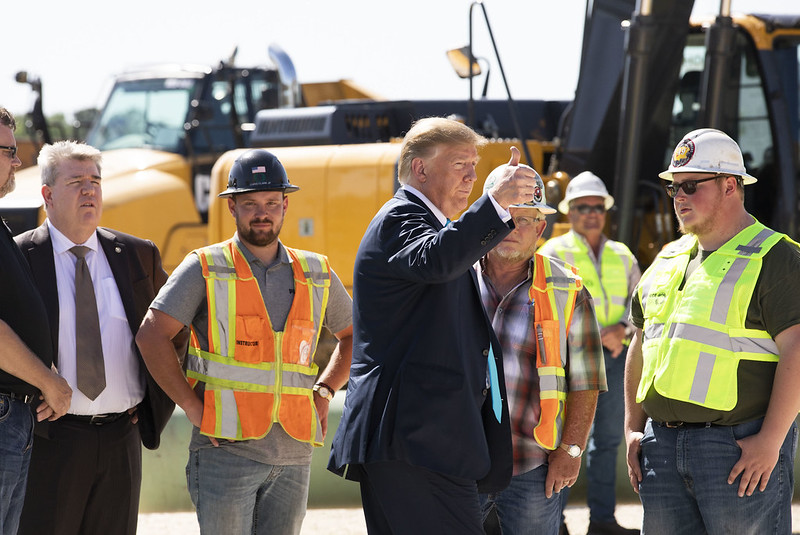
President Donald J. Trump gives a thumbs-up as he speaks with students and union officials on his arrival to the International Union of Operating Engineers International Training and Education Center Wednesday, April 10, 2019, in Crosby, Texas. (Official White House Photo by Joyce N. Boghosian)
You might think billionaire New York real estate mogul Donald Trump would be an awkward champion for America’s working class, but at The American Conservative, Skyler Adleta, a licensed electrician, explains Trump’s appeal. He writes:
I don’t really have anything in common with Donald Trump. I’m certain that he and I have not endured the same struggles, or have the same exact family values, or share every civil conviction. To be honest, I find aspects of his personality obnoxious and his frequent divisiveness tactless at times. I’ve also voted for him twice.
Thinking back on why I’ve voted for him, none of the reasons have much to do with the man himself. Trump turned the Republican party’s gaze towards the working class—towards people like me. Appealing to this sector of American society is tough. Most of us have been jaded by politics for years; establishment Republicans have been more obsessed with globalist agendas and catering to big business while Democrats have pandered to the highly educated and incited cultural discord. Trump, despite his many faults, lifted the rug to prove to the rest of his party that there are indeed millions of us scampering around down under it—many of us politically homeless and some of us completely disengaged from American politics altogether.
There were a few things Trump did other than acknowledge our existence that earned our trust. His almost comical outsider status, for one thing, worked in his favor. I almost viewed him as a kind of “Carnie” candidate—a political obscurity that you had to see to believe. Despite this, I was also convinced that he was bullheaded enough to pull off at least some of what he was promising to do.
Working in manufacturing at the time in 2016, I often worried about the stability of my future in this almost fossilized American industry. Trump’s talk of getting tough on China appealed to me. Growing up in the Midwest, Ohio specifically, I can drive to several old manufacturing towns nearby that are lopsided husks of what they used to be. A stark reminder of the skin America shed when our politicians and corporations decided that sacrificing the socioeconomic security of millions of Americans was worth the paper-thin bottom lines and burgeoning GDP as a result of outsourcing American manufacturing.
I am not completely averse to the Reagan-era, libertarian economic reflexes that have guided much of the Republican party’s fiscal policy for decades. I think there is real power in the markets these policies make. But I also see how retiring America’s manufacturing backbone here at home only to resurrect it more cheaply overseas has left my neighboring communities. It left the promise of the American dream in shambles for many in rural and suburban America, and for what? Cooler, cheaper widgets? Trump promised to scrape some of the dream back for the working class by renegotiating trade agreements, imposing tariffs, and championing domestic manufacturing growth.
He also promised to help achieve energy independence. Not only would this help the pocketbooks of Americans at the pump, but it would also be a boon to America’s industrial capabilities. Working to counter our dependence on China while also giving America access to cheaper, domestic energy was like unkinking a hose. For many of us in the working class, we saw the reality of fossil fuel use as inevitable—at least for now. Whether it was coming from overseas or being produced at home, we weren’t going to decrease our demand for fossil-fuel based products any time soon.
Adleta goes on to conclude that Trump shifted the GOP in a direction that made room for new leaders such as Sen. J.D. Vance, Gov. Ron DeSantis, and Sen. Josh Hawley, who focus more on Americans than on globalist agendas, foreign wars, and big corporations.
Action Line: Click here to subscribe to my free monthly Survive & Thrive letter.
E.J. Smith - Your Survival Guy
Latest posts by E.J. Smith - Your Survival Guy (see all)
- Rule #1: Don’t Lose Money - April 26, 2024
- How Investing in AI Speaks Volumes about You - April 26, 2024
- Microsoft Earnings Jump on AI - April 26, 2024
- Your Survival Guy Breaks Down Boxes, Do You? - April 25, 2024
- Oracle’s Vision for the Future—Larry Ellison Keynote - April 25, 2024















